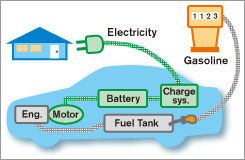At Nissan, we are taking a two-pronged approach. Even as we boost the efficiency of the internal combustion engine, we will also introduce hybrid cars and electric vehicles in the belief that electric-powered cars may become the mainstream vehicles of the future.
In the short- and mid-term, internal combustion engines will remain the mainstream for cars, and improving the efficiency of engines is key to reducing total emission of CO2 from our products. Nissan is working to develop and successively introduce engines in Japan that significantly reduce CO2 output, such as the three-liter car that can travel up to 100km on three liters of gasoline. Another effective solution to support CO2 reduction is to develop and market a car powered by bio-ethanol fuel. Also, we are developing plans to sell more new models with engines and transmissions that reduce CO2 emissions
 |
|
Basic concept of Plug-in Hybrid |
A hybrid electric vehicle or HEV is powered by a combination of a gasoline engine and an electric motor. HEVs have desirable environmental benefits: they produce less CO2 and reduced emissions. Nissan is developing a hybrid car using our own proprietary hybrid system to be ready during fiscal 2010 in North America and Japan.We are promoting the development of a plug-in hybrid car as an effective technology for reducing CO2 emissions. The plug-in hybrid uses an electric motor with a battery stack that can be recharged via a household power outlet. Similar to an electric car, this hybrid produces no CO2 when running on electric motor.
A visionary approach to CO2 reduction for the future; Vigorous development and market introduction of fuel-cell cars and electric cars
Specific plans for fuel-cell cars and electric cars
 |
By the first half of the decade after 2010, Nissan will introduce a new fuel-cell battery car developed in-house with improved stack performance in North America and Japan. |
 |
By 2010, we will conduct corroborative testing and begin introducing electric cars, starting with the Japanese market. |
Nissan was the world's first automaker to market and sell a car powered by a lithium-ion battery - the Prairie Joy EV in 1996 in Japan. We are committed to develop the core technologies for motors, batteries and inverters to turn the electric vehicle into a viable technology for consumers. Moving forward, we will promote further development and cost reductions in this specific area.
Nissan's strength lies with the development of light and compact lithium-ion battery capable of extended operation. We will further leverage this technological strength as we plan to establish a new company for the development, production and sales of these batteries. A dedicated new company would enable us to achieve significant improvements in the battery performance and a major reduction in costs to set a new standard for electric vehicle batteries. We expect to install our lithium-ion battery in Nissan's original hybrid cars, fuel-cell vehicles and electric vehicles.